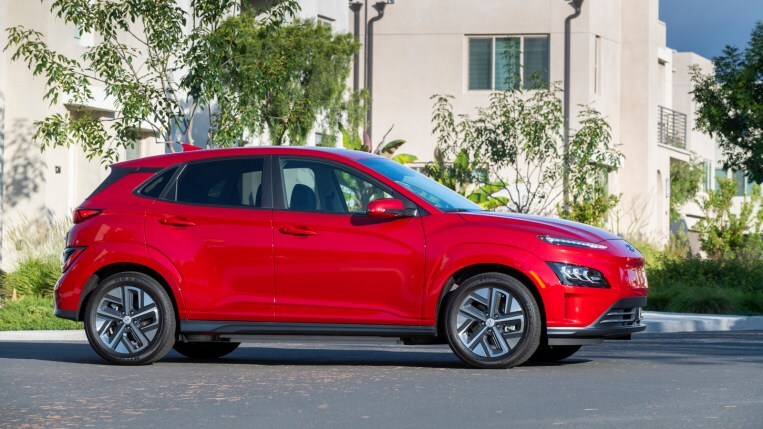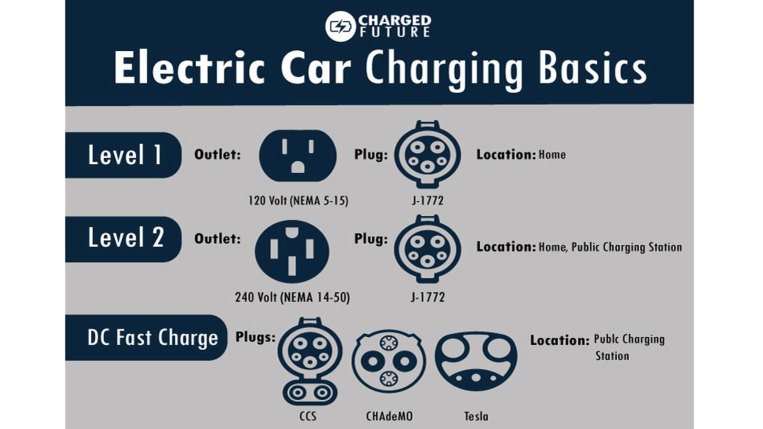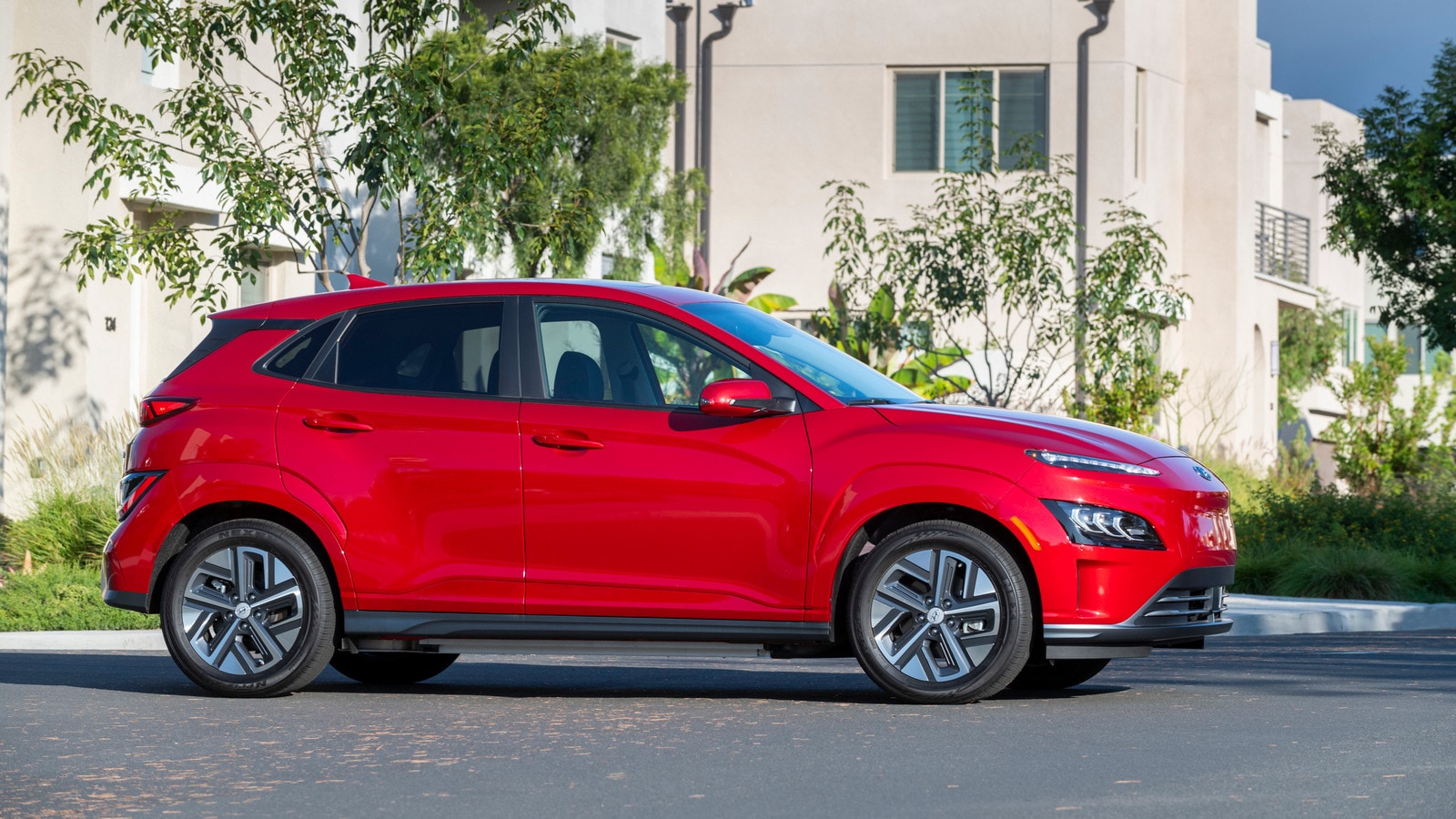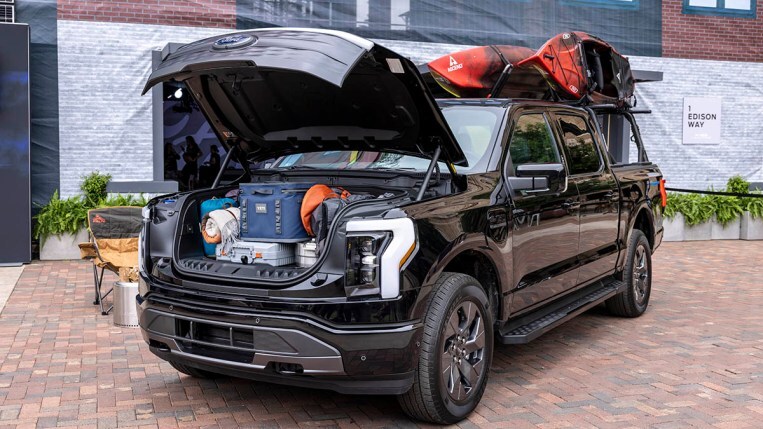[ad_1]

Buying an electric car can be a big decision because, like any car, it’s an investment. For first-time electric vehicle buyers, there’s even more to consider, like where to charge the EV. In this article, we answer the top questions people ask. We get it — buying and driving an EV takes more preparation and planning.
We have spent countless hours driving, charging, and learning about all the things you need to know about the intricacies of electric cars. Use this advice to help guide your decision and the below jump links to get where you need to go fast.
- What is an Electric Car?
- Do Electric Cars Use Oil?
- What Does EV Stand For?
- What Does BEV Stand For?
- What Does PHEV Stand For?
- What Does HEV Stand For?
- What Is a Hybrid Vehicle?
- When Was the First Electric Car Made?
- How Long Should It Take to Charge an Electric Car?
- How Much Are Electric Cars?
- How Do You Charge an Electric Car?
- Are Electric Cars Better for the Environment?
- How Much Does an Electric Car Cost?
- Are All Tesla Cars Electric?
- Do Electric Cars Have Transmissions?
- How Long Do Electric Cars Last?
- Where Can You Charge an Electric Car?
- Who Makes Electric Car Batteries?
- How Do Electric Cars Work?
- What Is EV Charging?
- What Are the Benefits of Driving an Electric Car?
- On What Principle Do Electric Vehicles Work?
- Which Is Better to Buy, a Fully Electric Car or a Hybrid?
- Are Electric Cars Low-Maintenance?
- How Do Hybrid and Electric Cars Help the Environment?
- How Do Hybrid Electric Cars Work?
- Why Has it Taken So Long to Develop Electric Cars?
- Are Electric Cars Going to Replace Gas Cars?
- Is it Safe to Use an Electric Vehicle?
- Why are Electric Vehicles So Expensive?
- Does the Term ‘Electric Car’ Include Hybrid Cars?
- How Successful are Electric Vehicles?
- Why are Electric Vehicles Not So Popular?
- Why are Electric Vehicle Batteries So Expensive?
1. What Is an Electric Car?
An electric car is a vehicle that uses an electric motor to drive its wheels. The electricity is stored in a battery pack that drivers can charge by plugging the car into a power source via a charging station or an outlet in their home, just as you would a lamp or appliance.
2. Do Electric Cars Use Oil?
No. Electric cars do not have traditional internal combustion engines. Therefore, you do not need engine oil to operate an electric vehicle. However, hybrids and plug-in hybrids use both electric motors and gasoline engines that can provide additional power. Both types of hybrid vehicles require oil changes.
3. What Does EV Stand For?
EV is an acronym for an electric vehicle. Types of EVs include fully electric vehicles, plug-in hybrid vehicles (PHEVs), and hybrid electric vehicles (HEVs). They also include fuel cell electric vehicles (FCEVs), which set themselves apart from other EVs by converting hydrogen to electricity for the motor rather than drawing energy from a battery.
4. What Does BEV Stand For?
BEV, or battery-powered electric vehicle, is another name for the standard electric vehicle.
5. What Does PHEV Stand For?
The car’s battery and electric motor can work on their own. But they also work in unison with the gas engine for power. PHEVs offer the capability of traveling on electric-only power for distances of up to 30 miles or more. When the battery power runs out, a PHEV vehicle uses its gasoline engine.
6. What Does HEV Stand For?
HEVs, or hybrid electric vehicles, run on both an internal combustion engine and an electric motor that uses energy stored in a battery.
7. What Is a Hybrid Vehicle?
Hybrid vehicles are cars that use both a gasoline engine and an electric motor. Hybrids can run on electricity alone at lower speeds, which means nothing comes out of the car’s exhaust pipe until the gas engine kicks on when needed for higher rates of speed or more acceleration.
Batteries get charged during braking and coasting. Those systems capture the energy that would otherwise be wasted and converts it into charge.
RELATED: Regenerative Brakes: How Do They Work?
8. When Was the First Electric Car Made?
Scottish inventor Robert Anderson created the first electric carriage in the 1830s using a non-rechargeable battery. However, the electric car didn’t come to the United States until Iowan inventor William Morrison created a super-efficient storage battery and added them to a horse-drawn carriage, inventing the first American four-wheeled electric vehicle around the 1890s.
9. How Long Should It Take to Charge an Electric Car?
It depends on your car — and several other factors. First, consider your power source and how much power your car can handle at once. Next, consider what type of charger.
Using a Level 1 charger with a standard 120-volt outlet found in your home provides about 5 miles of range per hour of charging. According to the United States Department of Transportation (DOT), it can take “40-50 hours to charge a battery electric vehicle (BEV) from empty and 5-6 hours to charge a plug-in hybrid electric vehicle (PHEV) from empty.”
Level 2 charging helps you recharge your EV faster. Level 2 uses a 240-volt plug typically used for electric dryers (read our story on EV incentives by state for potential rebate information). Using this type of charge, you can get about 35 miles or more of range per hour of charging. Besides at home, you can find many public charging stations at grocery stores, office buildings, or malls with Level 2 charging. The DOT says an EV can go from empty to full in 4-10 hours, and up to 2 hours for a PHEV.
Level 3, or DC fast charging, is found only commercially at public and Tesla charging stations. Also, not all electric cars available today offer DC fast charging. But newer ones offer the software and combination socket that will work with a DC plug. Most battery electric cars can get to an 80% charge in about 20 minutes to 1 hour. Most PHEVs currently on the market do not work with fast chargers.
Another factor for Level 3 charging is that electric cars don’t charge at a constant rate. EV testers often find that the first few percent of charge enters the battery quickly, and the last few percent can take much longer. Excessive fast charging can degrade the life of the battery compared with Level 2 charging.
MORE: How Long Does It Take To Charge an Electric Car?
10. How Much Are Electric Cars?
Electric cars generally cost more than conventional automobiles. But the pricing gap between the two is closing rapidly.
According to data from Cox Automotive, parent of Kelley Blue Book, the average transaction price for electric cars was $65,291 in September 2022 vs. gas-powered cars at $48,094.
“While EV prices currently align more closely with luxury versus mainstream, the market continues to grow and evolve with more choices hitting the scene all the time,” said Brian Moody, executive editor for Kelley Blue Book. “It’s no longer just ‘which Tesla is available,’ but rather an industry-wide boom with more EVs on the horizon from Ford, GM, Hyundai, and other manufacturers.”
11. How Do You Charge an Electric Car?

Knowing how to charge an electric car depends on where you’re charging it. If charging an electric vehicle at home, you can use a Level 1 charger with a standard 120-volt wall plug. You can also install Level 2 chargers (240 volts) that need special outlets like the kind you typically see for electric dryers.
If you need a quicker charge, you can find Level 3 chargers (also called DC fast chargers, or DCFCs) that use direct current at 480 volts at public charging stations typically found in places including shopping areas.
To charge your car in public, all you need to do is download the app for the charging station provider and a credit or debit card, so you can pay directly.
RELATED: What EV Charging Apps Do I Need on My Phone?
12. Are Electric Cars Better for the Environment?
According to the U.S. Environmental Protection Agency, electric vehicles typically operate with a smaller carbon footprint than gasoline cars, even when accounting for the electricity used for charging. Electric cars don’t burn gasoline, and because of that, they produce no tailpipe emissions. There are environmental costs of manufacturing, assembling, and mining materials for lithium-ion batteries for EVs. However, the EPA reports that even with the environmental costs, over the entire lifetime of an electric car, total greenhouse gas emissions remain lower than gasoline cars. They said, “That’s because EVs have zero tailpipe emissions and are typically responsible for significantly fewer [greenhouse gases] during operation.”
13. How Much Does an Electric Car Cost?
According to Cox Automotive, parent of Kelley Blue Book, the average transaction price for electric cars was $65,291 in September 2022. By comparison, gas-powered vehicles cost less, with an average transaction price of about $48,100 in the same timeframe. Even though electric cars cost more than gas-powered vehicles, some can qualify for up to $7,500 in federal incentives. Also, fully electric cars do not need gasoline or regular oil changes and other maintenance that gas cars require, which is another cost savings. Typically, fuel costs more than electricity, which is another money saver for people who drive EVs.
14. Are All Tesla Cars Electric?
Yes, Tesla only manufactures electric cars. Per Tesla’s website, the carmaker set out to prove that people could drive high-end, high-performance all-electric cars.
15. Do Electric Cars Have Transmissions?
No, electric vehicles do not use or need geared transmissions, thanks to the electric motor that powers them. While traditional internal combustion engines need multiple gears that power the car at different speeds, electric cars produce the same amount of torque at any given rotational speed and typically have a single-gear ratio.
16. How Long Do Electric Cars Last?
According to the U.S. Department of Energy Alternative Fuels Data Center, new electric vehicle batteries may last between 12 to 15 years in moderate climates and 8 to 12 years in extreme climates.
The federal government mandates that manufacturers offer at least 8 years or 100,000 miles of warranty protection on batteries. Many manufacturers offer 10 years or 100,000 miles. In California, laws require that automakers warranty EV batteries for 10 years or 150,000 miles. Toyota has adopted that standard in all 50 states.
17. Where Can You Charge an Electric Car?
You can charge an EV at home and at thousands of public charging stations throughout the United States and elsewhere. You can find charging stations anywhere via sites like Electrify America and EVgo.
18. Who Makes Electric Car Batteries?
For fully electric cars, top battery manufacturers include CATL, Panasonic, LG Energy Solution, and Panasonic. Panasonic has partnered with Tesla to manufacture lithium-ion batteries for some of the carmaker’s electric vehicles at the Tesla Gigafactory near Sparks, Nevada. LG makes batteries for manufacturers like General Motors and Volvo.
19. How Do Electric Cars Work?
Electric vehicles use electric motors instead of the gas-powered internal combustion engine found in a conventional automobile. Electric vehicles work by utilizing a large battery pack to power the electric motor. Unlike hybrids, which have both an electric motor and an internal combustion engine, EVs need to be plugged into a wall outlet or a charging station. Because EVs run on electricity instead of gasoline, EVs don’t emit exhaust from a tailpipe.
20. What Is EV Charging?
EV charging refers to powering up the battery that stores the energy necessary to make an EV’s electric motor run.
21. What Are the Benefits of Driving an Electric Car?
Electric vehicles don’t use fuel, which saves drivers money. Although drivers will likely pay more to buy an EV, operating an EV on electricity for a full month costs less than the price of a tank of gas. EV drivers also do not need to pay for regular oil changes and other maintenance that gas vehicles require.
Drivers can offset EV and plug-in hybrid purchase costs with federal, state, and local tax credits and other incentives such as those from utility providers.
The 2022 Inflation Reduction Act extends the current incentives of up to $7,500 in tax credits for certain electric cars and plug-in hybrids, and hydrogen-powered vehicles that meet its qualifications. The incentives include vehicles costing up to $80,000 for pickups, SUVs, and vans, and up to $55,000 for cars but not every vehicle qualifies. The federal government maintains a list of qualifying vehicles.
Used electric cars under $25,000 may qualify for a $4,000 tax credit, subject to a car buyer’s income and other limits. To qualify, used cars must be two model years old. The vehicle also must be purchased at a dealership.
Driving an electric car can be safer for the environment because it doesn’t run on gasoline, eliminating harmful emissions. Most EV drivers also can conveniently plug in their cars at home, and studies show most will charge at night, during off-peak hours when electricity rates are lower.
22. On What Principle Do Electric Vehicles Work?
An electric vehicle operates on the principle of conversion of energy. EVs work by converting electrical energy into mechanical energy through a battery-powered electric motor that moves the car.
23. Which Is Better to Buy, a Fully Electric Car or a Hybrid?
The choice between a fully electric car vs. a hybrid depends on your needs and budget. Although you could pay slightly more for a fully electric car, you can offset the price of certain plug-in hybrids (PHEVs) and electric cars thanks to tax breaks and pricing incentives.
With a fully electric car, you don’t need to pump gas, and you would be more likely to save money on certain maintenance since EVs do not use an internal combustion engine or oil.
Hybrids and plug-in hybrids provide no impediments when traveling long distances. Driving an EV requires additional time for charging. Extreme weather can also affect battery range and life. These drawbacks may not be issues in the future as battery technology improves.
24. Are Electric Cars Low-Maintenance?
Electric cars need less maintenance than conventional cars or hybrids. Electric vehicles operate with fewer moving parts than conventional vehicles. Besides tire rotation, drivers don’t need to worry about fluids like motor oil requiring replacement. Regenerative braking also reduces wear and tear on electric vehicle brakes.
25. How Do Hybrid and Electric Cars Help the Environment?
Most automakers have unveiled plans to overhaul their company business models to focus on battery-powered and electric vehicles over the next 10 to 15 years. Because electric vehicles don’t burn gasoline and hybrids burn much less, they generally produce fewer environmentally harmful emissions. However, questions persist as to how green hybrids and electric vehicles are.
Hybrids do produce some harmful emissions due to their internal combustion engines. In addition, electric vehicles have some environmental costs due to the emissions generated by manufacturing and assembling them and by mining materials for their lithium-ion batteries.
Other environmental impacts come from the generation of electricity used to recharge EVs. Clean renewables like hydro, wind, and solar power provide minimal impacts. Electricity generated by burning natural gas or coal is not emission-free. EV power’s cleanliness depends on how it’s generated — so that’s something to keep in mind. Still, the EPA says that over the entire lifetime of an electric car, total greenhouse gas emissions remain lower than cars powered by gasoline.
26. How Do Hybrid Electric Vehicles Work?
Hybrid electric vehicles are powered by both an internal combustion engine and an electric motor, which uses energy stored in batteries that get charged via regenerative braking and by the gas-powered internal combustion engine. They can also power auxiliary loads and reduce engine idling when stopped, preserving energy and increasing fuel economy.
27. Why Has It Taken So Long to Develop Electric Cars?
Developing electric cars for modern times has been slow going due to the low cost and reliability of gas-powered vehicles. However, battery technology has steadily improved, bringing their range and purchase price more in line with internal combustion vehicles. Because of environmental concerns, automakers see electric cars as the future.
28. Are Electric Cars Going to Replace Gas Cars?
Experts project that electric vehicles will make up 25% of new car sales by 2035. Automakers like GM hope to pivot exclusively to EVs by that time. However, EV sales will still only make up 13% of all cars on the road.
Experts believe electric vehicles will make up the majority of new car sales by 2050. Even then, experts believe drivers will still be using conventional gas-powered vehicles.
29. Is It Safe To Use an Electric Vehicle?
Yes, electric vehicles are generally safe to use. But a series of recalls and battery fires involving EVs have generated safety concerns, including saltwater-damaged electric cars after Hurricane Ian. Lithium-ion batteries can overheat and break down due to defective parts or charging EVs designed for slow charging with faster DC ones.
Many automakers now use safer batteries and liquid cooling systems that keep the battery from overheating to combat this. Tesla also uses extra aluminum plating for fire protection between the battery pack and the seats.
30. Why Are Electric Vehicles So Expensive?
Electric vehicles continue to be more costly than their gas counterparts due to battery costs. Although EV battery prices have dropped dramatically, an EV’s battery remains its single most expensive component due to the materials that make up the cathode in each lithium-ion battery. These cathodes are typically made of expensive metals like lithium and cobalt.
Some automakers like Tesla continue to look for ways to lower battery costs. For example, Tesla has done this by building its own battery factory, Gigafactory 1, in Nevada.
31. Does the Term ‘Electric Car’ Include Hybrid Cars?
The term “electric cars” does not include hybrid cars. But the term “electrified vehicles” includes fully electric, hybrid cars, and plug-in hybrids.
Hybrid vehicles, including the type that plug in operate using battery power combined with a gas-powered engine. Fully electric cars operate on battery power only.
32. How Successful Are Electric Vehicles?
Although politicians and automakers are making a major push to manufacture and promote EVs, consumers remain skittish about going all-electric for several reasons, including range anxiety and cost. Still, their popularity continues to increase as more EV charging stations continue to get installed in retail shopping areas, parking garages, and office buildings. In addition, federal, state, and local incentives continue to make electric vehicles more attractive to purchase.
33. Why Are Electric Vehicles Not So Popular?
Range anxiety and cost remain the biggest hurdles to consumer acceptance of electric vehicles. Still, as more charging stations pop up and more manufacturers produce and push electric vehicles, there’s no doubt their popularity will increase.
34. Why Are Electric Vehicle Batteries So Expensive?
An electric car battery remains its single most expensive component. It’s expensive due to the materials that make up the cathode in each lithium-ion battery. These cathodes are typically made of costly metals like lithium and cobalt. However, as technology improves, automakers are finding ways to lower costs.
In addition, some manufacturers like Tesla began manufacturing their own battery technology, which helps to lower costs, too. Keep in mind that if you take care of your electric car battery, it shouldn’t need replacing for up to 10 years or longer.
Related Electric Car Articles:
[ad_2]
Source link


